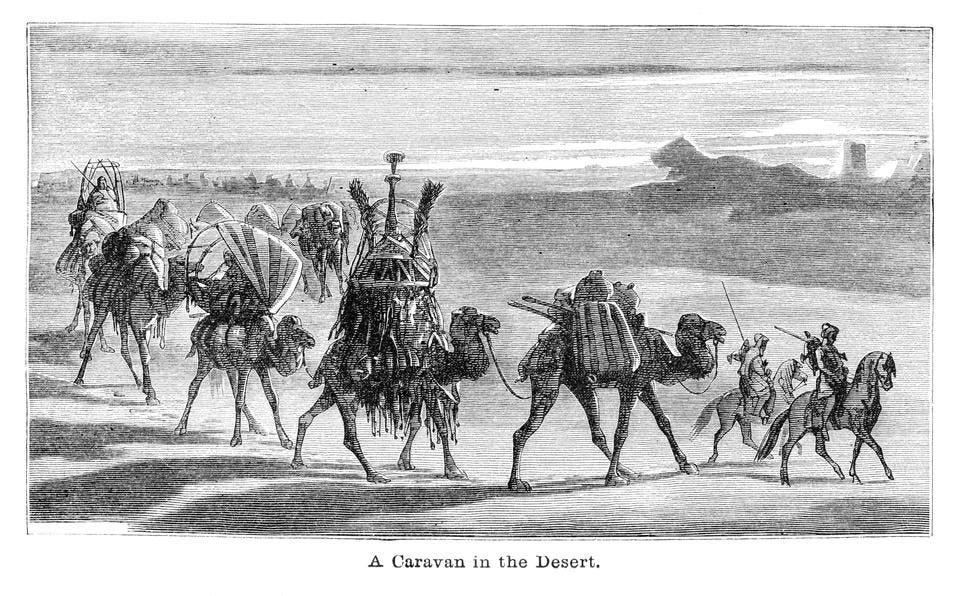The Silk Road: A Timeless Blueprint for Innovation and Entrepreneurship
The Silk Road, stretching over 4,000 miles, was more than a mere trade route connecting the East and West. It was a vibrant network of ideas, cultures, and innovations that shaped the course of history. Beyond the exchange of silk, spices, and precious goods, the Silk Road served as a breeding ground for problem-solving and entrepreneurship. The challenges faced by ancient traders—risky journeys, financial instability, and cross-cultural communication—mirrored those faced by modern startup founders. The solutions they devised, such as resource-sharing, trust-building, and efficient inventory management, offer timeless lessons for building and scaling innovative businesses today.
1. The Power of Resource-Sharing: From Caravans to Co-Working Spaces
One of the most significant challenges for Silk Road traders was the perilous nature of their journeys. Crossing vast deserts, rugged mountains, and lawless territories made traveling alone a risky and costly endeavor. To mitigate these risks, traders embraced the concept of resource-sharing by forming caravans—large groups of merchants, laborers, and animals traveling together. These caravans provided safety in numbers, reducing the likelihood of bandit attacks, and allowed merchants to split the costs of guides, translators, and security. This arrangement enabled traders to focus on their core expertise—buying and selling goods—rather than managing every aspect of the journey.
This principle of resource-sharing is equally relevant for modern startups. Few early-stage ventures have the resources to build everything from scratch. Instead, startups can benefit from shared resources to reduce costs and leverage expertise. Co-working spaces offer an affordable alternative to renting private offices, while freelancers and contractors can handle non-core tasks such as marketing or web development. Open-source software and no-code platforms provide cost-effective tools for building products, and startup incubators and accelerators offer mentorship and networking opportunities that might otherwise be out of reach. Just as caravans enabled Silk Road traders to thrive, resource-sharing allows startups to conserve resources and focus on innovation.
2. Building Trust: The Foundation of Silk Road Success
Trust was the cornerstone of success for Silk Road traders. Operating in a diverse and often fragmented marketplace, traders needed to build strong relationships with partners, suppliers, and customers from different cultural backgrounds. Sogdian merchants, known for their linguistic skills and cultural adaptability, often acted as intermediaries, facilitating trade between East and West. By investing in long-term relationships and demonstrating goodwill, traders could secure repeat business and navigate the complexities of cross-cultural commerce.
This emphasis on trust-building is just as crucial for modern startups. In the early stages of a business, relationships with stakeholders such as investors, suppliers, and customers can make or break the venture. Startups that prioritize customer-centric approaches often find it easier to gain traction. For example, maintaining close relationships with suppliers can help navigate supply chain disruptions, while satisfied customers can become brand advocates, driving growth through word-of-mouth. Similarly, strong relationships with investors can provide the financial and emotional support needed to weather challenges. Just as Silk Road traders built trust through personalized service and cultural understanding, startups must cultivate strong relationships to establish a loyal customer base and secure long-term success.
3.Inventory Management: Maximizing Value While Minimizing Complexity
Silk Road traders understood the importance of efficiency in their operations. Transporting goods over long distances required careful planning to maximize profits while minimizing costs. Merchants often focused on high-value, low-volume goods such as silk, spices, and precious stones, which generated substantial returns without overburdening their caravans. This focus on efficiency allowed traders to manage logistical challenges and maintain profitability, even as they covered vast distances.
Modern startups can draw valuable lessons from this approach to inventory management. Prioritizing high-margin offerings allows startups to generate revenue without requiring massive resources. For physical product startups, lean inventory management and just-in-time (JIT) practices can help reduce waste and minimize storage costs. By focusing on what adds the most value to their customers, startups can optimize their resources and build a sustainable business model. Just as Silk Road traders balanced profitability and logistics, startups must strike a similar balance to thrive in competitive markets.
4. The Lasting Legacy of the Silk Road
The Silk Road’s influence extends far beyond its role as a trade route. It laid the foundation for global interconnectedness, fostering cultural exchange and economic collaboration on an unprecedented scale. The entrepreneurial spirit of Silk Road traders—resourceful, adaptable, and relationship-driven—has left an indelible mark on the way businesses operate today. From the caravanserais that dotted the trade route to the bustling markets of modern cities, the legacy of the Silk Road continues to inspire innovation and collaboration.
5. Embracing the Future: Lessons from the Past
The parallels between the Silk Road and modern entrepreneurship are striking. Both involve navigating uncertainty, building trust, and optimizing resources. As startups strive to innovate and scale, they can draw inspiration from the resourcefulness and resilience of Silk Road traders. By embracing resource-sharing, trust-building, and efficient management, startups can overcome challenges and create lasting value in an ever-changing world.
6. Conclusion: Timeless Strategies for Modern Entrepreneurs
The Silk Road may seem like a relic of the past, but its lessons are timeless. From resource-sharing to trust-building and inventory management, the strategies employed by ancient traders continue to resonate with modern entrepreneurs. Startups that embrace these principles can not only survive but thrive in today’s fast-paced business environment. The Silk Road reminds us that innovation and entrepreneurship are not new concepts—they are rooted in human ingenuity and the relentless pursuit of opportunity. As we navigate the challenges of the 21st century, the Silk Road offers a powerful blueprint for building sustainable, customer-centric businesses that stand the test of time.












